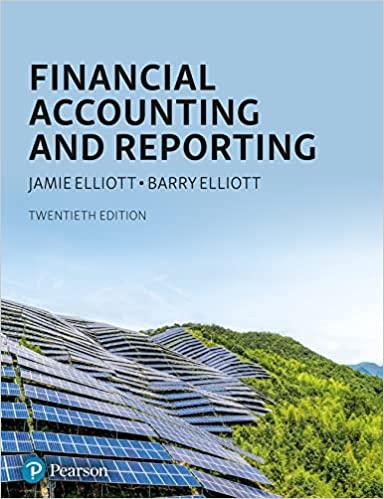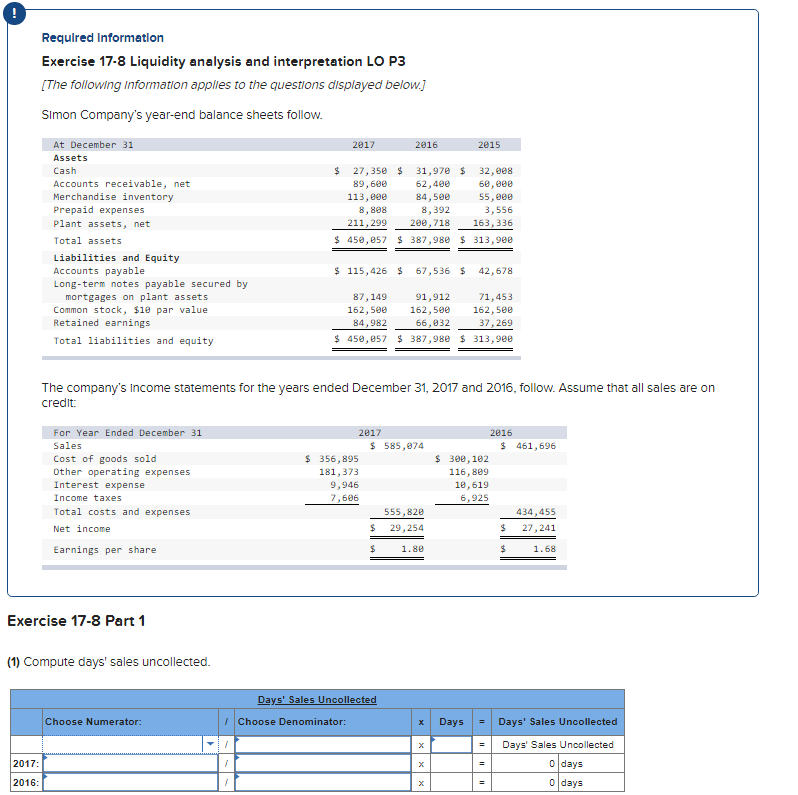
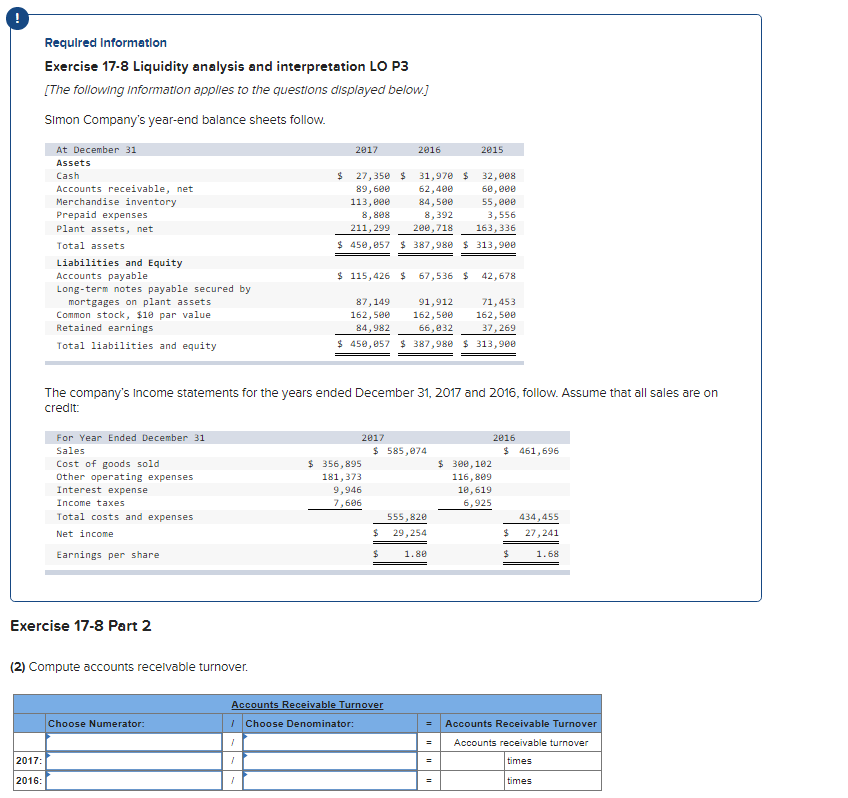
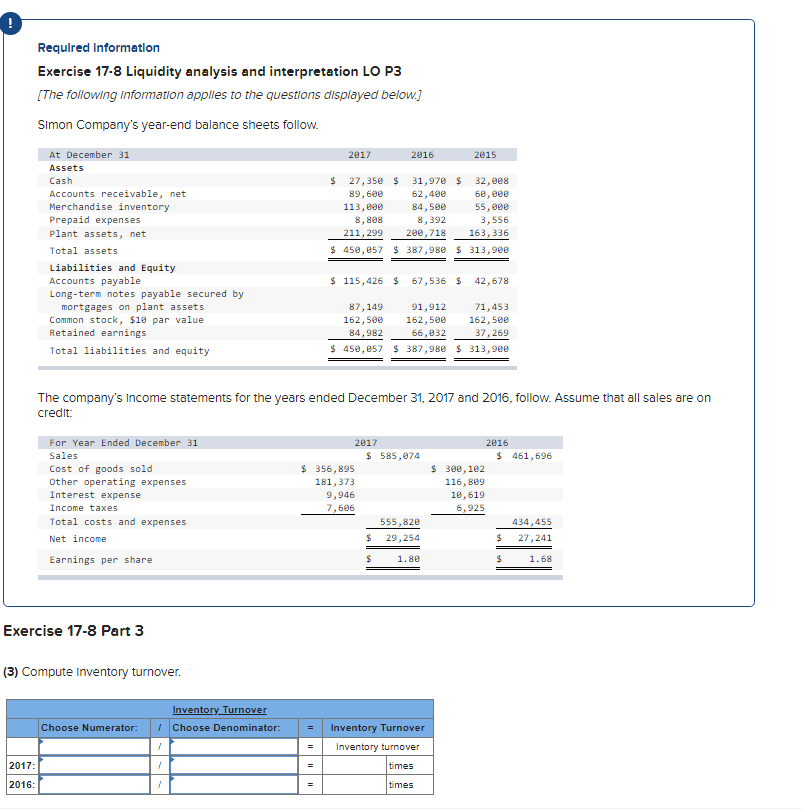
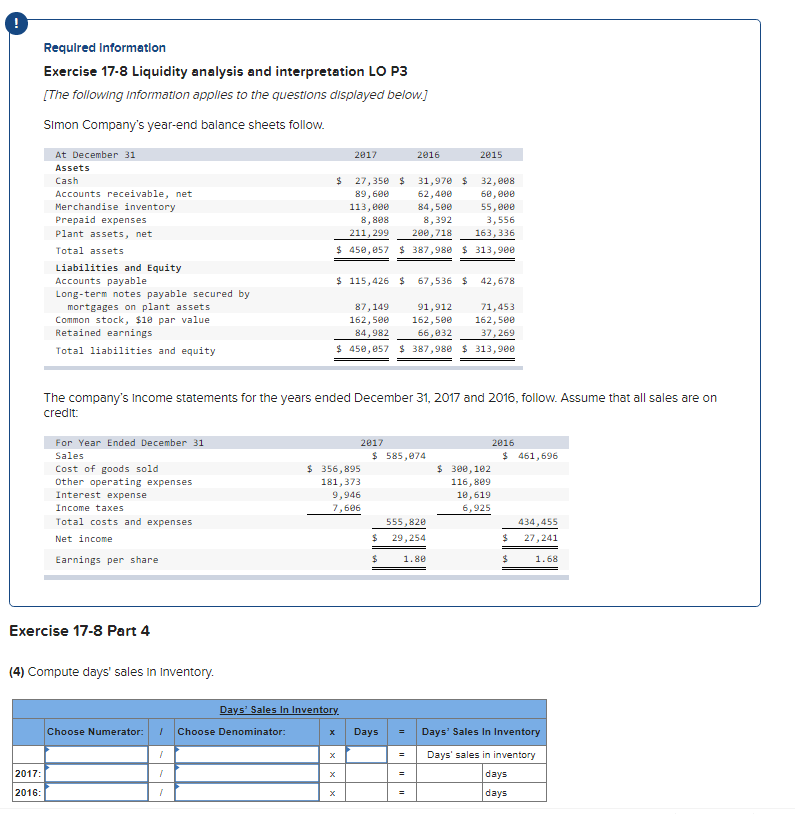
Required Information Exercise 17-8 Liquidity analysis and interpretation LO P3 [The following information applies to the questions displayed below.) Simon Company's year-end balance sheets follow. At December 31 2017 2016 2015 Assets Cash $ 27,350 $ 31,970 $ 32,008 Accounts receivable, net 89,600 62,400 60, eee Merchandise inventory 113, eee 84,500 55,00 Prepaid expenses 8,808 8,392 3,556 Plant assets, net 211,299 200, 718 163,336 Total assets $ 450,857 $ 387,980 $ 313,900 Liabilities and Equity Accounts payable $ 115,426 $ 67,536 $ 42,678 Long-term notes payable secured by mortgages on plant assets 87,149 91,912 71,453 Common stock, $10 par value 162,5ee 162,50 162,500 Retained earnings 84,982 66,832 37,269 Total liabilities and equity $ 450,657 $ 387,980 $ 313,900 The company's Income statements for the years ended December 31, 2017 and 2016, follow. Assume that all sales are on credit: For Year Ended December 31 Sales Cost of goods sold Other operating expenses Interest expense Income taxes Total costs and expenses Net income 2017 $ 585,074 $ 356,895 181,373 9,946 7,606 555,820 $ 29,254 2016 $ 461,696 $ 300, 102 116,809 10,619 6,925 434,455 $ 27,241 Earnings per share $ 1.80 $ 1.68 Exercise 17-8 Part 1 (1) Compute days' sales uncollected. Days' Sales Uncollected 1 Choose Denominator: Choose Numerator: x Days = Days' Sales Uncollected X = 2017: 1 Days' Sales Uncollected o days 0 days X 2016: = Required Information Exercise 17-8 Liquidity analysis and interpretation LO P3 [The following information applies to the questions displayed below.) Simon Company's year-end balance sheets follow. 2017 2016 2015 At December 31 Assets Cash Accounts receivable, net Merchandise inventory Prepaid expenses Plant assets, net Total assets Liabilities and Equity Accounts payable Long-term notes payable secured by mortgages on plant assets Common stock, $10 par value Retained earnings Total liabilities and equity $ 27,350 $ 31,970 $ 32,008 89,600 62,400 60, eee 113,000 84,500 55,000 8,808 8,392 3,556 211,299 200, 718 163,336 $ 450,857 $ 387,980 $ 313,900 $ 115,426 $ 67,536 $ 42,678 87,149 91,912 71,453 162,500 162,500 162,500 84,982 66,32 37,269 $ 450, 57 $ 387,980 $ 313,900 The company's Income statements for the years ended December 31, 2017 and 2016, follow. Assume that all sales are on credit: For Year Ended December 31 Sales Cost of goods sold Other operating expenses Interest expense Income taxes Total costs and expenses Net income 2017 $ 585,074 $ 356,895 181,373 9,946 7,606 555,820 $ 29,254 2016 $ 461,696 $ 300, 102 116,809 10,619 6,925 434,455 $ 27,241 Earnings per share $ 1.80 $ 1.68 Exercise 17-8 Part 2 (2) Compute accounts receivable turnover. Choose Numerator: Accounts Receivable Turnover 1 Choose Denominator: 1 Accounts Receivable Turnover Accounts receivable turnover 2017: 1 = times 2016: 1 = times Required Information Exercise 17-8 Liquidity analysis and interpretation LO P3 [The following information applies to the questions displayed below.) Simon Company's year-end balance sheets follow. 2017 2016 2015 At December 31 Assets Cash Accounts receivable, net Merchandise inventory Prepaid expenses Plant assets, net Total assets Liabilities and Equity Accounts payable Long-term notes payable secured by mortgages on plant assets Common stock, $10 par value Retained earnings Total liabilities and equity $ 27,350 $ 31,970 $ 32,008 89,600 62,400 60, eee 113, eee 84,5ee 55, eee 8,888 8,392 3,556 211,299 200, 718 163,336 $ 450,857 $ 387,980 $ 313,900 $ 115,426 $ 67,536 $ 42,678 87,149 91,912 71,453 162,50 162,500 162,500 84,982 66,832 37,269 $ 450,857 $ 387,980 $ 313,900 The company's Income statements for the years ended December 31, 2017 and 2016, follow. Assume that all sales are on credit: For Year Ended December 31 Sales Cost of goods sold Other operating expenses Interest expense Income taxes Total costs and expenses Net income 2017 $ 585,674 $ 356,895 181,373 9,946 7,686 555,820 $ 29,254 2016 $ 461,696 $ 300, 102 116, 809 10,619 6,925 434,455 $ 27, 241 Earnings per share $ 1.80 $ 1.68 Exercise 17-8 Part 3 (3) Compute Inventory turnover. Choose Numerator: Inventory Turnover 1 Choose Denominator: / = Inventory Turnover Inventory turnover 2017: times 2016: = times Required Information Exercise 17-8 Liquidity analysis and interpretation LO P3 [The following information applies to the questions displayed below.) Simon Company's year-end balance sheets follow. 2017 2016 2015 At December 31 Assets Cash Accounts receivable, net Merchandise inventory Prepaid expenses Plant assets, net Total assets Liabilities and Equity Accounts payable Long-term notes payable secured by mortgages on plant assets Common stock, $10 par value Retained earnings Total liabilities and equity $ 27,350 $ 31,970 $ 32,008 89,600 62,480 60, eee 113,000 84,500 55, eee 8,888 8,392 3,556 211,299 200, 718 163,336 $ 450,857 $ 387,980 $ 313,900 $ 115,426 $ 67,536 $ 42,678 87,149 91,912 71,453 162,500 162,500 162,500 84,982 66,832 37,269 $ 450,057 $ 387,980 $ 313,900 The company's Income statements for the years ended December 31, 2017 and 2016, follow. Assume that all sales are on credit: For Year Ended December 31 Sales Cost of goods sold Other operating expenses Interest expense Income taxes Total costs and expenses Net income 2017 $ 585,074 $ 356,895 181,373 9,946 7,606 555,820 $ 29,254 2016 $ 461,696 $ 300, 102 116, 809 10,619 6,925 434,455 $ 27,241 Earnings per share $ 1.se $ 1.68 Exercise 17-8 Part 4 (4) Compute days' sales In Inventory. Days' Sales In Inventory Choose Denominator: Choose Numerator: 1 X Days 11 Days' Sales In Inventory Days' sales in inventory 1 2017: / days 2016: / = II days










